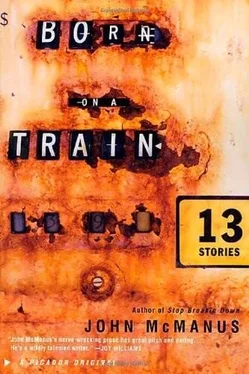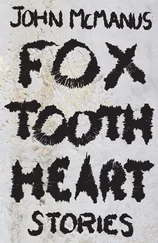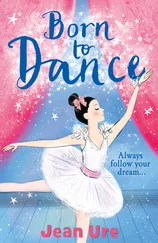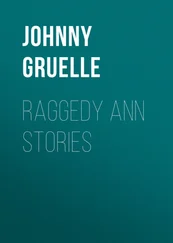The crop will fail, Letitia said. There will be a drought.
Things are starting to come together, the girl said.
They can’t come together, Letitia said. You’re dead.
I’m glad you don’t hate me anymore for what I said to Mommy.
She’ll always hate you. She’ll never, ever change.
But even as she spoke Letitia knew she lied. Wendy was changing — she was stiffening, her blood was giving up to gravity. Her lips were curling inward to greet her dentures. The men and women in the wrecks had died. Their bodies looked like husks in which no blood had ever flowed. They weren’t solid; their air was spread across the decades. They bled no blood and sank into the earth and then an interstate was built, and when they died again in forty years they fell down where they’d died before and lived again forever. No one stopped the second time to give a lift to Wendy and Letitia, nor the sixth or the one-hundredth, nor did dust clouds ever cease to billow when the house fell.
Cats kept dying, every cycle. Letitia’s knees grew weak and fat; it never failed to happen. Her cells developed insulin resistance; her pancreas broke down. She bought the same cane, every June in 1984, unto infinity, at Sears, and it always cost nineteen ninety-five. She got wider with the interstate, which grew and grew until it was reborn and Letitia grew; she saw bulldozers adding new lanes to her life. She watched the smoggy sunsets from her condo as they smoldered in the sky above the interstate.
Barbara was lonely. Her parents and sisters and brothers and Granny were always around, but they didn’t play soccer; they were too selfish. She was lonely and hot — the sun sat in her lap, slid down her throat in the back of the pickup, a hundred degrees, two in the afternoon. The heat was intoxicating as she leaned against a ridge of Duraliner plastic. Her sister Sheila’s head hid houses one by one as they rode north.
Garrett stuck his middle finger up and pressed it to the window. He was Barbara’s cousin, the only child of her dead uncle, and he was a hateful snitch. He sat inside the cab flipping Barbara off whenever he remembered to. When Barbara scowled and knocked against the window, her father reached back with a fist and hit the glass twice as hard. Barbara flinched. The truck swerved, as did the car behind them, and she laughed at that car, whose color was a dull gray; it had a dent in its bumper. She wished everybody in the world had a dented bumper, even her father. She kicked Sheila’s leg and said, You know what Mama’s gonna buy you at Kmart?
Sheila took her thumb out of her mouth and said, No, what?
Absolutely nothing.
Sheila kicked Barbara back.
Barbara liked the sound of absolutely. Again and again she said it: absolutely nothing, absolutely nothing. Floyd, her older brother, told her to shut up. He held Rhonda, four years old, in his lap; she was crying. He didn’t tell her to shut up like he told Barbara, but he stroked her sand-blond hair. Barbara took a ragged pair of jeans from the truck bed and held them over the side, where swiftly moving air inflated them so that the legs crackled like whips. She had to hold them tightly. When Floyd saw what she was doing, he grabbed the jeans and swatted her in the head with the stiff denim waist. A belt loop hit her in the eye as Floyd said, If Pa sees you doin that shit, he’ll pull over and whup you good.
Floyd tossed the jeans through the open window into the cab, where they landed behind Granny’s head. After a while she shifted her body so that they fell behind her, but Barbara couldn’t tell that she’d noticed the new cushion at all.
* * *
Pa had said he’d buy Barbara a new soccer ball. It was the end of the month, and he’d finally been paid. Barbara had been waiting for weeks. I’m only gettin you the cheapest one, Pa said, so I don’t want no whining. Garrett was going to buy a rifle so he could shoot squirrels. His father had just died so he had a hundred dollars. He wanted a.22, he said, just like his father, who’d shot squirrels with his eyes closed. The more Barbara told him not to shoot squirrels, the more squirrels he killed. Soon they’d all be dead. Barbara stared at Garett’s neck hard enough to burn flesh, but Garrett never moved, not even to breathe.
Crap, Rhonda yelled, her r unformed, and Floyd slapped her.
It was the hottest day of the summer, and the sun was almost too much to bear. Barbara used the stomach of her shirt to wipe sweat from her cheeks and forehead. Her father drove them into town past kudzu-covered trailers long uprooted from their foundations, past new and high-priced ranchers and split foyers. The truck sputtered like it spat out metal shards onto the road with each full revolution of the wheels.
Crap crap crap, said Rhonda.
Sheila looked uncomfortable in the heat. It was hard to tell, because she always looked unhappy; that was just how her face was shaped. Barbara felt bad for what she’d said. What if Pa really didn’t buy Sheila anything at the store, she thought. Hey, she said to Sheila, I’m sure they’ll buy you something, but maybe there wasn’t enough money. They pulled off the highway by the children’s home on the hill and coasted into Kmart’s parking lot and stopped. Barbara climbed out of the truck. Her throat was parched; she felt like she’d sweated all the water out of her body. Rhonda and Sheila smelled like little-girl sweat, and she moved away from them. Mama got out of the cab with the baby in her left arm and fanned herself with a torn cloth diaper, and Garrett hopped down behind her. Granny didn’t move. Get out, old woman, Pa yelled at her, or we’ll lock you up in here.
You hush up, Mama said, and Granny blinked her eyes. Mama leaned into the truck and yelled in Granny’s ear, Granny, we’re here.
Granny looked at Mama blankly.
Who’s got the pants? asked Pa.
Barbara had em, said Garrett.
Barbara didn’t know how to hold em right, said Floyd. I threw em up front.
They looked inside the truck and saw the jeans behind Granny’s neck as a pillow againt the glass. Good Lord, woman, said Pa. He reached inside and grabbed them from behind her. Her head hit the glass and bounced, but she didn’t seem to notice.
You be careful, Mama said wearily.
She don’t need a pillow.
Help her down.
Will you quit tellin me what to do? Shit. Floyd, help her down.
Floyd carried her out of the truck as the rest of them walked inside. He kicked the door shut behind him and set her feet down on the pavement, holding her hand to help her balance. God helps those that helps themselves, Pa said, turning his head to look.
You should have left her home then, Mama said.
No I shouldn’t have. This is family business. It affects all of us. Inside the store the air-conditioning hit Barbara like an ocean wave. She closed her eyes and basked in it, and Garrett pushed her from behind. Get out of my way. Barbara stumbled and moved to the side and followed her family past the cash registers and swallowed spit to ease her thirst. Sweat tingled icily on her cheeks in the cool air.
Now don’t yuns be runnin all over the dang store, Pa said. We got some business first. Yuns are gonna stay right here.
Can’t I just go look at the sports aisle? Barbara asked.
What did I just say?
He led them to the returns counter, where he leaned forward toward the young clerk who adjusted the cash drawer and reached below the counter for a paper. Hey, Pa barked at him.
Just a second, sir, said the clerk without looking up.
Pa laid the jeans flat on the counter. These is my boy Floyd’s, he said loudly, and then, Hey. Look. He spread the jeans out so the clerk would see the dirt stains all across the ripped and shredded fabric, a two-inch hole in each knee, the ragged cuffs, thick grass stains, a broken zipper. The seat was streaked with axle grease that zagged down to the hips in three black lines. These is my eldest boy Floyd’s, Pa said again. They didn’t work out too good.
Читать дальше












